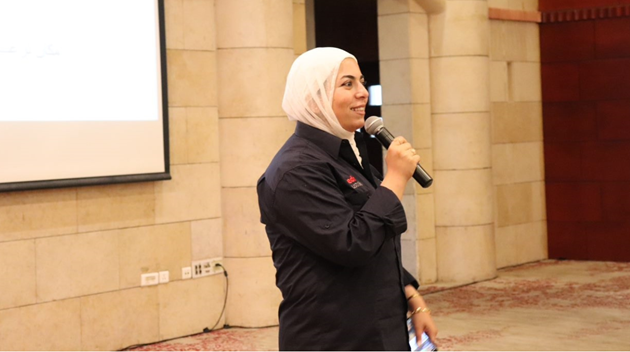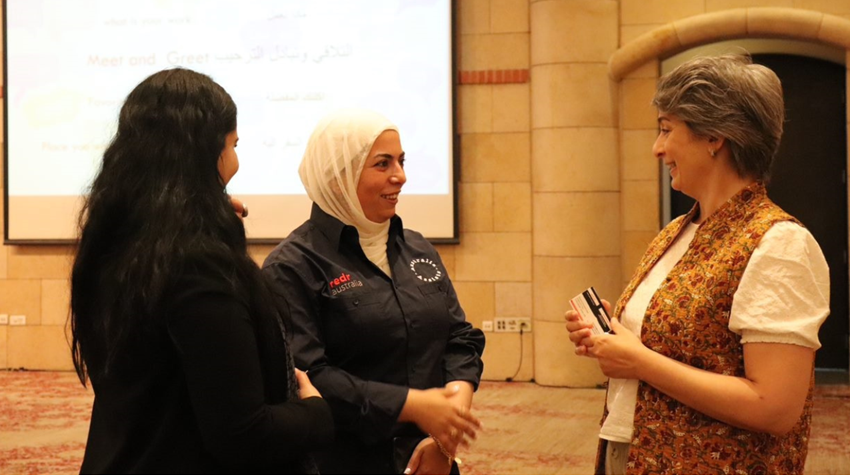Over decades Jordan has accepted displaced peoples from across the Middle East, including over 2 million registered Palestinian refugees, representing one fifth of Jordan’s population. Iraqi refugees are also displaced in Jordan and more recently, Syrian refugees have fled to Jordan. Approximately 1.3 million Syrians are now in Jordan, and the most recent earthquake will likely force more to seek shelter into Jordan.
“I am proud to be Jordanian as Jordan hosts a lot of crises, a lot of refugees, and we have and we are still doing our best to help the most vulnerable Jordanians and our guests from different nationalities,” said Australia Assists deployee Deema.
Australia is committed to supporting Jordan’s refugee response, both through direct aid, and through the deployment of Australia Assists humanitarian experts. Since 2017, Australia has committed more than $270 million in response to the Syria conflict crisis, including over $105 million in support of refugees and their host communities in Jordan. In the same timeframe, Australia Assists has deployed 28 technical specialists to Jordan, helping to strengthen the much-needed humanitarian support delivered.
Helping Jordanians take the lead in local humanitarian response
Localisation is the commitment to support local actors to be at the centre of decision-making when responding to humanitarian crises. Local humanitarian actors understand their own contexts better than international people and are the first on the ground in any disaster. As they are from the community, they will deploy preparedness strategies, coordinate the first response to recovery, and remain when international experts leave.
The localisation agenda recognises and respects the central role of local actors, commits to building their capacity where needed, and calls for investment into local capabilities. Australia is supporting this important agenda through Australia Assists deployments.
Deema is a Jordanian national deployed in country by Australia Assists to help build capacity and strengthen localisation efforts as a Monitoring, Evaluation, Accountability and Learning (MEAL) Officer with UN Women Jordan. “I’ll always be proud to be a Jordanian as we never say no to any requests for help, and we always seek to improve ourselves in the international community,” said Deema. Through local deployees like Deema, Australia is implementing its commitment to the localisation process, recognising the ability already existing in communities affected by humanitarian crises, and using Australia’s aid resources to support them.
In her role, Deema drove the work on Jordan’s first gender-responsive Localisation Framework, which was drafted in 2021 by her Australia Assists predecessor. Embedded within the Humanitarian Partnership Forum’s Localisation Task Team, Deema drove stakeholder buy-in and fostered local ownership of the framework. The implementation process of the framework commits national and international humanitarian actors to involve crisis-affected populations in decision-making processes throughout the response cycle.
 Deema presented at a Localisation MEAL Framework workshop in Amman, Jordan attended by approximately 70 participants from local and international NGOs, donors and UN agencies.
Deema presented at a Localisation MEAL Framework workshop in Amman, Jordan attended by approximately 70 participants from local and international NGOs, donors and UN agencies.
“Being deployed through Australia Assists means a lot to me,” said Deema. “First, it means that Australia Assists really believes in localisation…being deployed as local staff means that Australia Assists believes in the local capacity and their commitment to improving local communities.”
Helping to protect communities from Sexual Exploitation and Abuse
Cindy deployed to Jordan in November 2021 on a one-year assignment to support the strengthening of the United Nations Relief and Works Agency for Palestine Refugees in the Near East (UNRWA) framework on Preventing Sexual Exploitation, Abuse and Harassment (PSEAH).
The prevention of sexual exploitation and abuse is a top priority of the humanitarian community. People who are reliant on humanitarian aid, and who are displaced from their home are particularly vulnerable to exploitation. When sexual exploitation and abuse happens by UN personnel, it has a devastating effect on the communities the UN serves, and the trust they have in providers of humanitarian assistance. Preventing Sexual Exploitation, Abuse and Harassment (PSEAH) policies, training, reporting and enforcement mechanisms are critical to protecting vulnerable populations.
In her role as Ethics Policy Officer, Cindy researched how other UN agencies were implementing PSEAH policies, and applied their lessons learned to the UNRWA context. “The revised protection from sexual exploitation and abuse policy will help communities because it provides clear guidance on prevention and response,” said Cindy. “The aim is to prevent sexual exploitation and abuse, but if it does happen, the policy provides clear guidance on how to respond to allegations and also, how the victims or witnesses can access victim assistance, services and support.”
“Field officers have really appreciated the support provided by Cindy through the deployment thanks to Australia Assists,” said Myriam, UNRWA Ethics Office Chief of Cindy’s work to educate both staff and communities on PSEAH prevention and reporting mechanisms. “…This will make an enormous difference to the beneficiaries and the communities in the field.”
“I’m proud to be in Jordan as an Australia Assists deployee,” said Cindy. “I’ve always wanted to work for UNRWA because I believe in the work that they do for and with Palestine refugees and I’m very grateful for this opportunity to work together on very meaningful work.”
Australia Assisting the region
While more than one third of Australia Assists deployments to the region have been to Jordan, the program has supported an additional nine Middle Eastern countries with humanitarian expertise. Since 2017, Australia Assists has deployed 61 technical specialists to 14 host organisations. These deployments have focused on gender, disability inclusion, localisation and the provision of immediate humanitarian coordination support. Australia Assists has developed a strong reputation for effective support in a region continuing to face complex challenges.
Learn more about Australia Assists and the work of deployees before, during and after emergencies.


